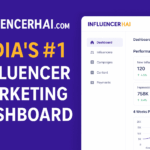The Department of Consumer Affairs has recently announced that the government is issuing guidelines for influencers who promote health and wellness products and services. It will now be mandatory for influencers in this category to display their qualifications to the department and their audiences to establish credibility when advising on health issues.
Earlier this year, the government and ASCI released guidelines for influencers to clearly disclose their relationship with brands and describe the nature of promotional content. The consumer affairs department emphasized the need for these guidelines, as health and wellness influencers directly influence consumer health decisions.
Influencer marketing has become a significant part of health, wellness, and fitness budgets. According to the e4m INCA Influencer report, the influencer marketing industry is currently valued at around Rs 1275 crore and is projected to grow at a CAGR of 25% over the next five years.
In a recent interview, Rohit Kumar Singh, Secretary of the Department of Consumer Affairs, stated, “We don’t want to interfere with the model. We are wary of the consumer being taken for a ride.”
e4m sought insights from industry experts to understand the impact of this decision on the influencer economy and the strategy for influencers moving forward. Dhruv Modwil, Founder of Nocturnal Media, believes this move will significantly impact the industry and subject influencers to scrutiny.
He states, “The recent move by the Department of Consumer Affairs to scrutinize the qualifications of Health and Wellness influencers is likely to have a significant impact on the industry.
Influencer marketing in this field typically involves promoting products such as supplements and fitness items, and the scrutiny of qualifications is necessary to ensure that audiences can trust both the influencer and the brand they are promoting.
By requiring influencers to meet specific standards, the DOCA is taking a solid step towards providing audiences with the best and most accurate sources of knowledge in the Health and Wellness industry.”
“In light of recent developments, influencers must be mindful of their content, particularly when claiming health and fitness benefits. Influencers must conduct thorough research and due diligence to ensure their posts are responsible and accurate,” Modwil added.
Sumit Gupta, Founder of Viral Pitch, also emphasizes the importance of this development in preventing the misuse of the healthcare industry for profit and safeguarding the health and well-being of consumers.
He points out that brands and marketers will now need to carefully consider the qualifications of influencers before engaging in promotional activities related to medical products or practices. Gupta further notes that this may increase demand for qualified healthcare influencers, as they can only promote such products or methods.
“I believe these regulations will help ensure that influencer marketing in the health and wellness industry is done responsibly and ethically, promoting the safety and well-being of consumers. Influencers must disclose their qualifications and credentials when promoting health and wellness products or practices.
If they are not qualified experts, they should be transparent with their audience about the source of their information and disclose any potential conflicts of interest, including compensation or other benefits they may receive for promoting specific products,” Gupta added.
Wellness influencer Garima Bhandari also supports the move, citing that people have been increasingly concerned about their health after the Covid-19 pandemic. She believes that having specific guidelines and regulatory policies to monitor health advice on social media is beneficial.
However, she acknowledges that qualifications and years of experience in the related field should be considered when giving health and wellness advice based on personal experience.
“The increased consumption of social media and digital content during the pandemic has undoubtedly accelerated the market for instant health, wellness, and fitness advice on social media, sometimes from individuals whose core competency isn’t fitness or wellness-related at all,” Bhand.
